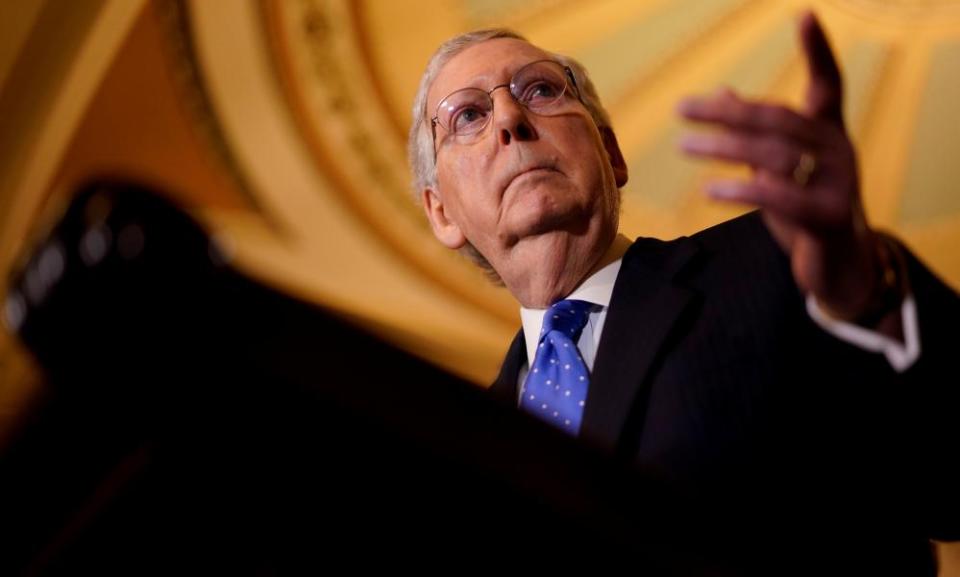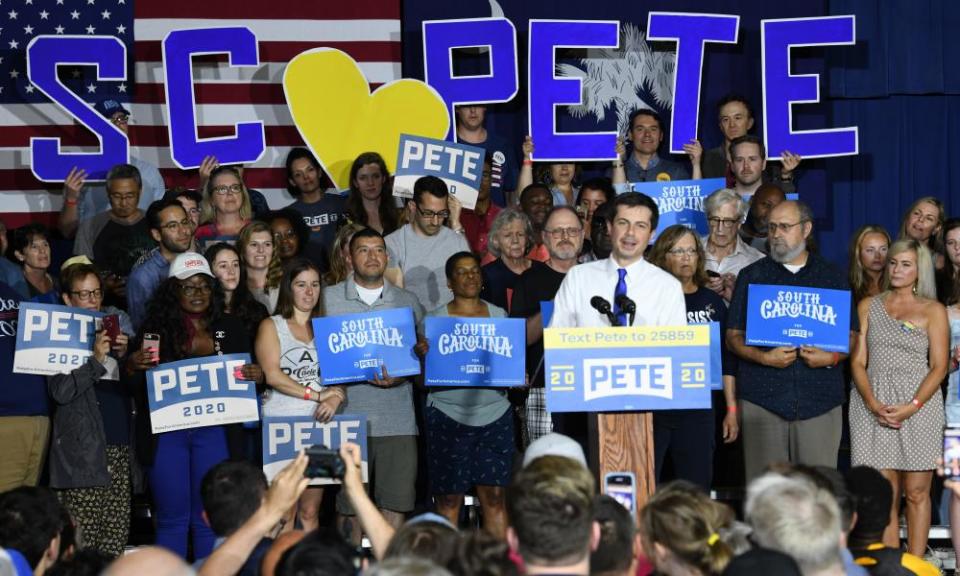'I have a plan for that': Elizabeth Warren leads the Democratic 'ideas primary'

Elizabeth Warren has a plan for that. And that. And that as well. On Wednesday, the Massachusetts senator unveiled the 12th major policy proposal of her presidential run, a $100bn plan to combat the opioid crisis.
Related: There are many reasons not to impeach Trump. The House should do it anyway
Warren’s reputation as the ideas generator has gained widespread attention. But she is not the only candidate for the Democratic nomination who has white papers to flaunt.
In the last few days, Bernie Sanders has rolled out a package of proposals to “rebuild rural America” and released legislation to cap credit card interest rates at 15%. Kamala Harris has come out with a bill to financially assist public defenders. Cory Booker has proposed sweeping reforms to the nation’s gun laws. Kirsten Gillibrand has vowed to only nominate supreme court justices who would uphold Roe v Wade. Amy Klobuchar has laid out a $100bn plan to combat drug and alcohol addiction and improve mental healthcare.
The “ideas primary” is shaping up to be one of the most revealing fronts in the 21-candidate contest for the Democratic nomination. Taking advantage of a field full of 2020 hopefuls eager to distinguish themselves from the rest of the pack, activists are injecting into the debate proposals once dismissed as too radical and too ambitious.
I think voters understand that the differences between candidates are not as critical as the differences with Trump
Neera Tanden
From Medicare for All to a Green New Deal, affordable housing to baby bonds, ideas are the currency of progressive politics. But in a presidential primary personality, identity, experience and electability – an elusive measure of the ability to beat Donald Trump – count too. Sometimes even more.
“Policy provides really important cues about the character and priorities of a candidate,” said Neera Tanden, president of the Center for American Progress, a liberal thinktank in Washington. “But with Trump as president, I think voters also understand that the differences between candidates are not as critical as the differences with Trump.”
Ahead of the first debate in late June, progressive activists are ramping up efforts to influence the contest of ideas. At candidate forums in Washington, Texas and New York, and in televised town halls, activists and voters have pushed candidates on fraught issues such as reparations for slavery, electoral college reform and voting rights for prisoners.
“The grassroots activism that helped shepherd in the most diverse, most progressive Congress in our country’s history has not died down any since the 2018 election,” said Jennifer Epps-Addison, the president and co-executive director of the Center for Popular Democracy Action, which co-hosted the We the People summit in Washington last month.
“It has transformed into an even bigger force in communities all around the country that is pushing presidential candidates to speak to the needs of everyday Americans.”
The ‘Grim Reaper’
The youth-led Sunrise Movement is the force behind one of the most successful activist-driven campaigns: the Green New Deal, a sprawling social and economic initiative to fight climate change and address income and racial inequality. Nearly every candidate has been asked if they support the plan.
“Having such an open field forces a more robust discussion about the values, the principles, the policies that differentiate the candidates,” said Varshini Prakash, executive director of the group.
She added: “Given the moment that we find ourselves in, the candidates that have the most powerful and potent climate policies will rise to the top.”

Mitch McConnell speaks with reporters on Capitol Hill this week.Photograph: Aaron P Bernstein/Reuters
As the candidates build their policy agendas, many policies are still ideas lacking details. And even if a Democrat wins the White House, many of their proposals under discussion aren’t politically feasible with a Republican-controlled Senate.
Mitch McConnell, the majority leader, has vowed to be the “Grim Reaper” of progressive policies, singling out the Green New Deal and Medicare for All as “socialist” policies he would pronounce “dead on arrival” in the Senate.
Related: All the president’s judges: how Trump can flip courts at a record-setting pace
“More important than the details of any one policy idea that these candidates may have is a plan for how they would actually achieve it,” said Brian Fallon, executive director of Demand Justice, a progressive group that aims to rally liberals around the federal judiciary. “Without a strategy for overcoming Mitch McConnell in the Senate and a supreme court that’s been packed by Donald Trump, a lot of the policy conversation is going to be purely academic.”
His group has applauded candidates who embrace norm-shattering reforms such as abolishing the Senate filibuster and expanding the supreme court.
Nonetheless, the 2020 policy debate illustrates how far the party has moved left on healthcare, taxes, gun control and more. That has forced many candidates to embrace progressive and populist policies as they reckon with past positions out of step with the new left.
An increasingly vocal cohort of Democrats fear contenders are being pushed too far, potentially hobbling the eventual nominee in a fight against Trump.
This House was won not on the platform of national single-payer healthcare but on a commitment to improve the ACA
Heidi Heitkamp
In an opinion piece for the Washington Post this week, the former North Dakota senator Heidi Heitkamp wrote: “In their rush to earn the support of the party’s highly energized primary electorate, some of the best prospective Democratic standard- bearers are embracing positions that would present serious risks when it comes to challenging and defeating Trump in the general election.”
Heitkamp urged Democrats not to abandon Barack Obama’s Affordable Care Act in favor of Medicare for All, citing as evidence the 2018 midterms.
“This House majority was won not on the platform of national single-payer healthcare,” she wrote, “but on a commitment to improve the ACA.”
Not all candidates are leading with policy ideas. The former vice-president Joe Biden has risen in the polls since entering the race with a promise to restore a sense of normalcy after a Trump presidency. In his first visit to Iowa, Biden promised he was “gonna talk a lot over this campaign about what my policies are”. Noting his audience were all standing, however, he promised to not “go into great detail” just yet.

Pete Buttigieg holds a town hall in North Charleston, South Carolina.Photograph: Meg Kinnard/AP
Similarly, the South Bend, Indiana, mayor, Pete Buttigieg, has leapt to the front of the pack with an appeal for a new generation of leadership. Pressed during a CNN town hall on why his campaign website doesn’t have a policy section, he said he planned to take his time.
“It’s important we don’t drown people in minutiae before we’ve vindicated the values that animate our policies,” he said. “We go right to the policy proposals and we expect people to be able to figure out what our values must be from that.”
The former Texas congressman Beto O’Rourke was pilloried as a policy lightweight when he entered the race. But last week he became the first candidate to unveil a major proposal on climate change. The plan calls for a $5tn investment in infrastructure and innovation over a decade and aims to achieve net-zero emissions by 2050.
‘Challenging power’
Policy, of course, is no guarantee of success. Hillary Clinton lost to Trump though her platform was far more expansive and detailed. But even in defeat, policy presents an opportunity to shape the agenda.
In 2016, Sanders lost the primary to Clinton but popularized the concept of Medicare for All. It now enjoys support from several candidates and has received its first real congressional hearing in decades. Even the long-shot candidate Andrew Yang has found some success injecting his plan for a “universal basic income” into the policy debate.
Related: It's not enough to break up Big Tech. We need a progressive vision for Silicon Valley
All that said, Warren has undoubtedly set the pace, churning out so many policies that her unofficial campaign slogan has become: “I have a plan for that!”
The senator has plans to break up Big Tech, to create universal childcare, to cancel student-loan debt and to invest in public housing. More proposals are likely before the first debate.
“Senator Warren is clearly winning the ideas primary,” said Adam Green, co-founder of the Progressive Change Campaign Committee, which has endorsed her.
Green said it was not only the depth and volume of Warren’s plans that was winning converts and boosting her in the polls. It was also the way she weaves her ambitious agenda into a “narrative about challenging power”.
“We’re still living in an outsider moment,” he said. “To defeat Trump, we need someone who is seen as an equal and opposite change agent and who will shake up the system, but do it for real on behalf of regular people and not the special interests.”

